Analysing Atlassian's Cultural Adaptation using IHRM Practices
VerifiedAdded on 2024/05/29
|12
|2193
|71
Report
AI Summary
This report examines Atlassian's international expansion into New Zealand and Indonesia, focusing on the impact of cultural differences on team performance. Using Hofstede's cultural dimensions, the report analyzes the cultural landscapes of Australia, New Zealand, and Indonesia, highlighting disparities in power distance, individualism, masculinity, uncertainty avoidance, long-term orientation, and indulgence. It identifies issues arising from the company's uniform HR policies, particularly in Indonesia, where collectivism and a different approach to decision-making prevail. Recommendations include implementing targeted training programs to boost employee confidence and shifting from individual to team-based reward schemes to align with Indonesian cultural values. The report concludes that managing cultural diversity and adapting HR policies are crucial for Atlassian's success in international markets.
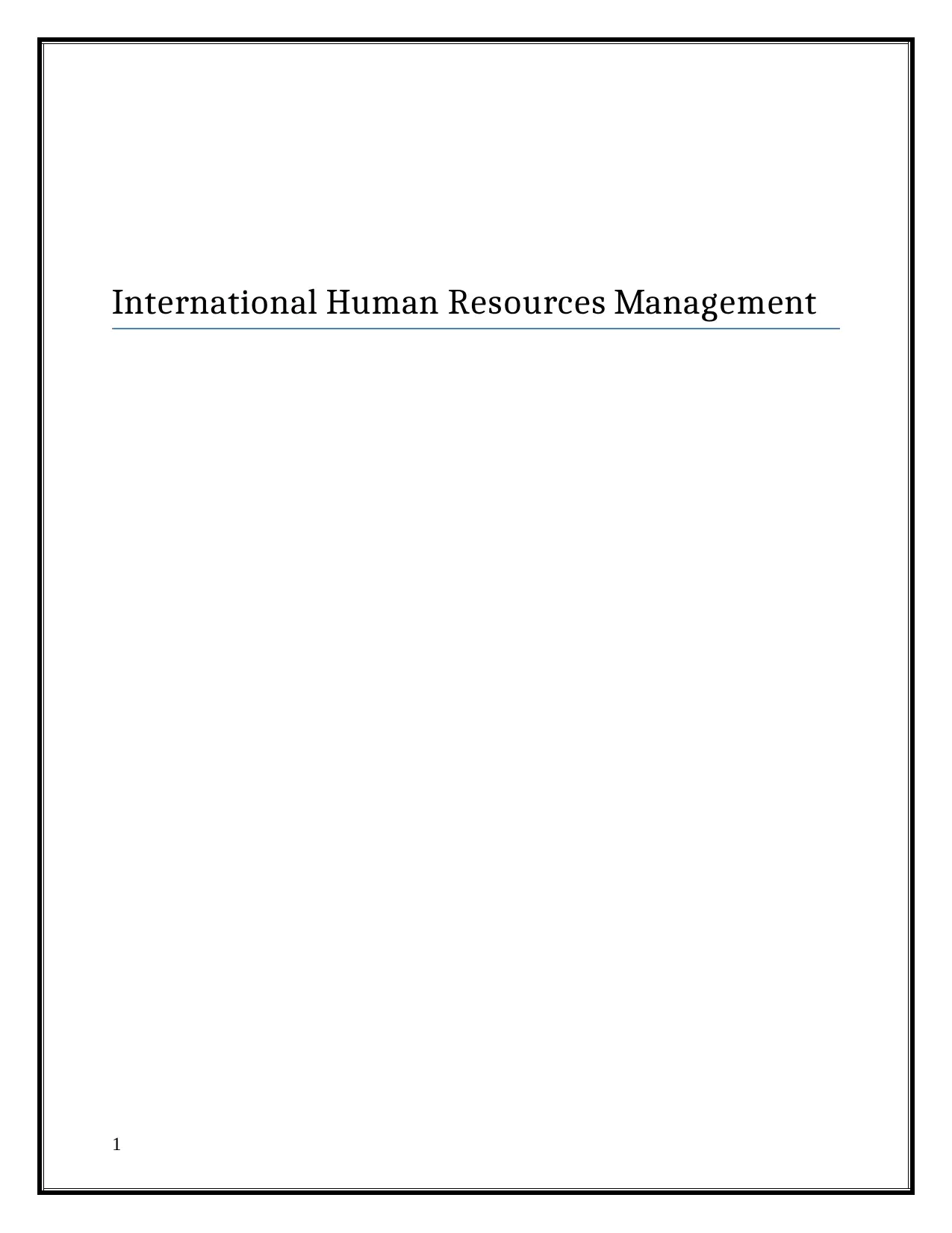
International Human Resources Management
1
1
Paraphrase This Document
Need a fresh take? Get an instant paraphrase of this document with our AI Paraphraser
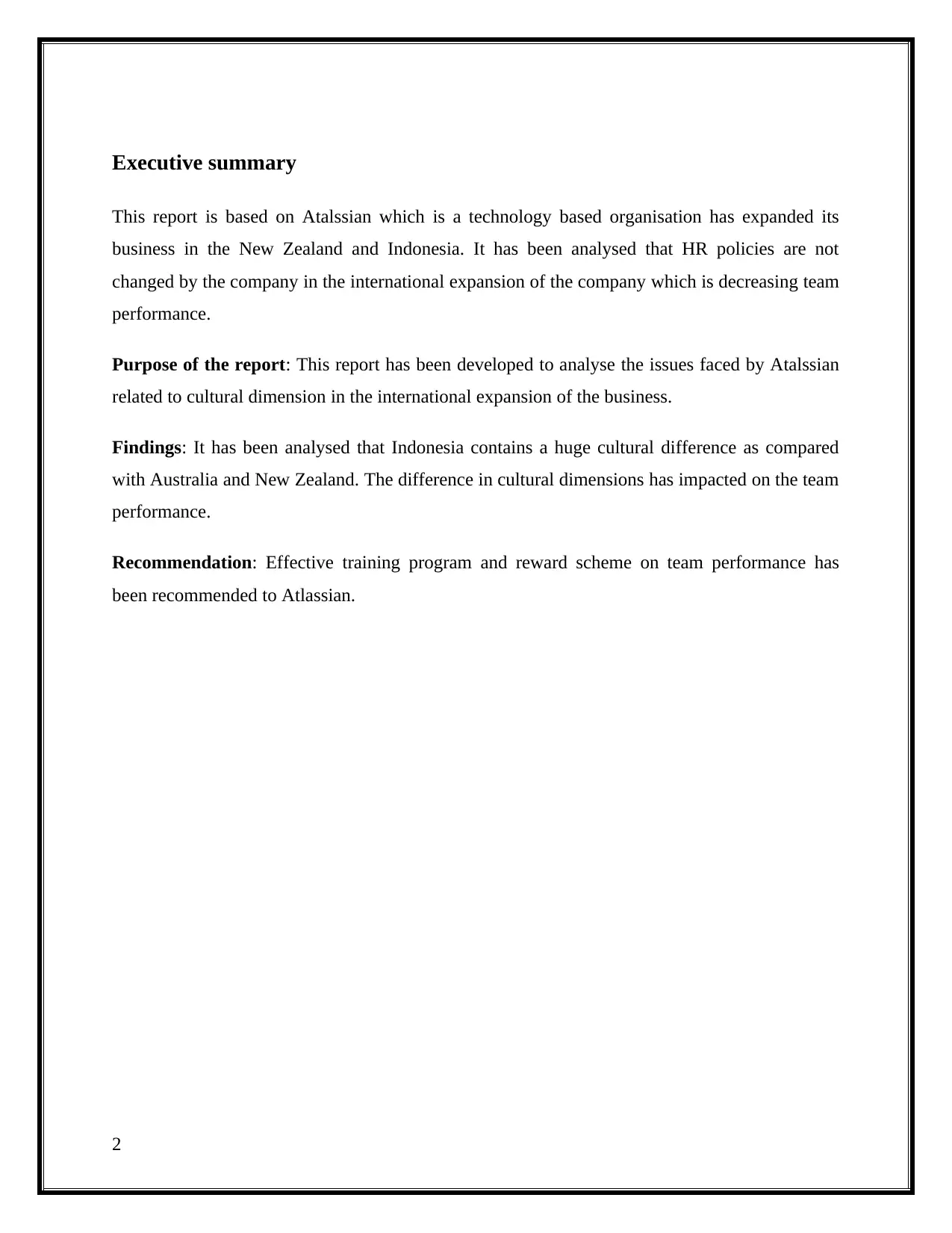
Executive summary
This report is based on Atalssian which is a technology based organisation has expanded its
business in the New Zealand and Indonesia. It has been analysed that HR policies are not
changed by the company in the international expansion of the company which is decreasing team
performance.
Purpose of the report: This report has been developed to analyse the issues faced by Atalssian
related to cultural dimension in the international expansion of the business.
Findings: It has been analysed that Indonesia contains a huge cultural difference as compared
with Australia and New Zealand. The difference in cultural dimensions has impacted on the team
performance.
Recommendation: Effective training program and reward scheme on team performance has
been recommended to Atlassian.
2
This report is based on Atalssian which is a technology based organisation has expanded its
business in the New Zealand and Indonesia. It has been analysed that HR policies are not
changed by the company in the international expansion of the company which is decreasing team
performance.
Purpose of the report: This report has been developed to analyse the issues faced by Atalssian
related to cultural dimension in the international expansion of the business.
Findings: It has been analysed that Indonesia contains a huge cultural difference as compared
with Australia and New Zealand. The difference in cultural dimensions has impacted on the team
performance.
Recommendation: Effective training program and reward scheme on team performance has
been recommended to Atlassian.
2
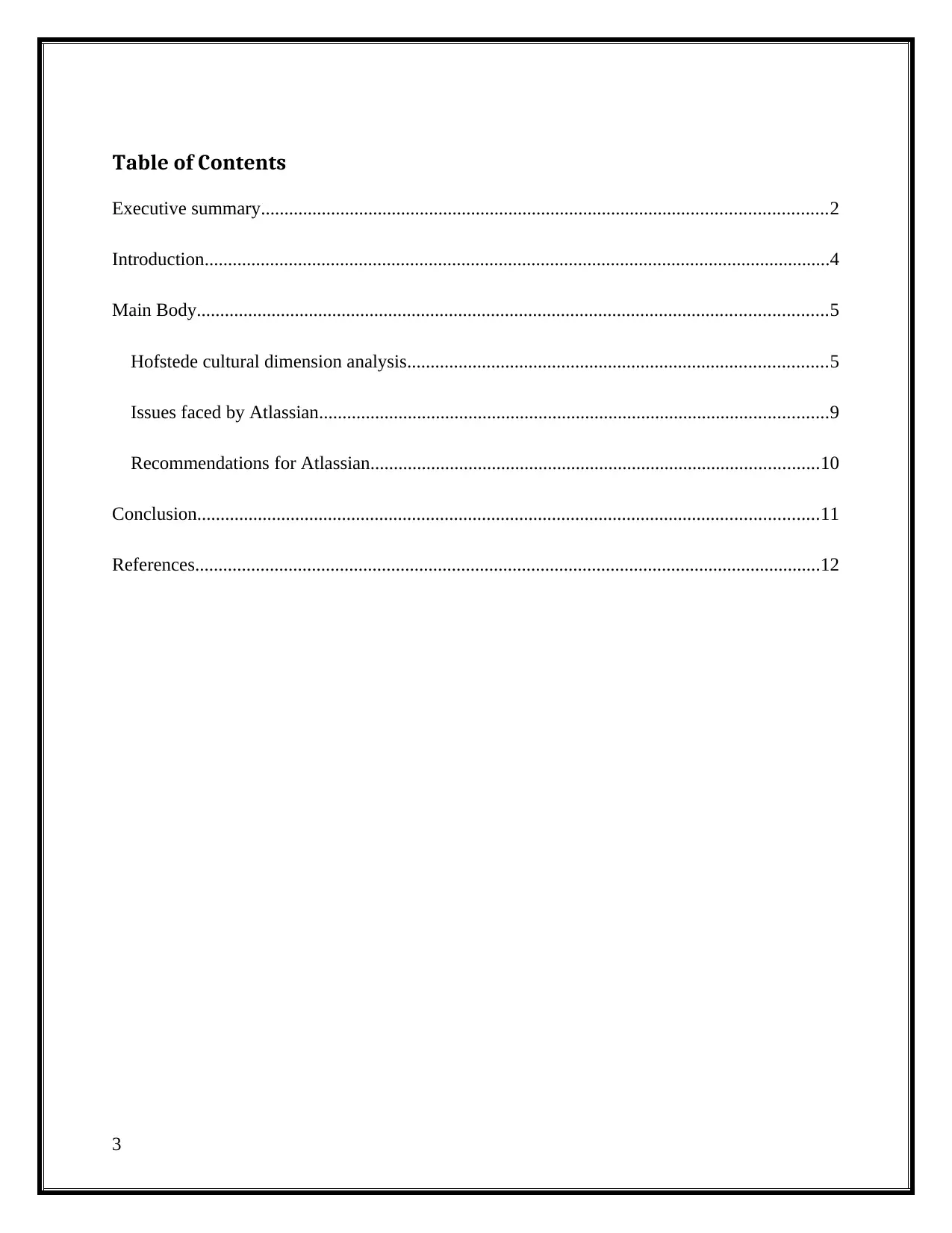
Table of Contents
Executive summary.........................................................................................................................2
Introduction......................................................................................................................................4
Main Body.......................................................................................................................................5
Hofstede cultural dimension analysis..........................................................................................5
Issues faced by Atlassian.............................................................................................................9
Recommendations for Atlassian................................................................................................10
Conclusion.....................................................................................................................................11
References......................................................................................................................................12
3
Executive summary.........................................................................................................................2
Introduction......................................................................................................................................4
Main Body.......................................................................................................................................5
Hofstede cultural dimension analysis..........................................................................................5
Issues faced by Atlassian.............................................................................................................9
Recommendations for Atlassian................................................................................................10
Conclusion.....................................................................................................................................11
References......................................................................................................................................12
3
⊘ This is a preview!⊘
Do you want full access?
Subscribe today to unlock all pages.

Trusted by 1+ million students worldwide
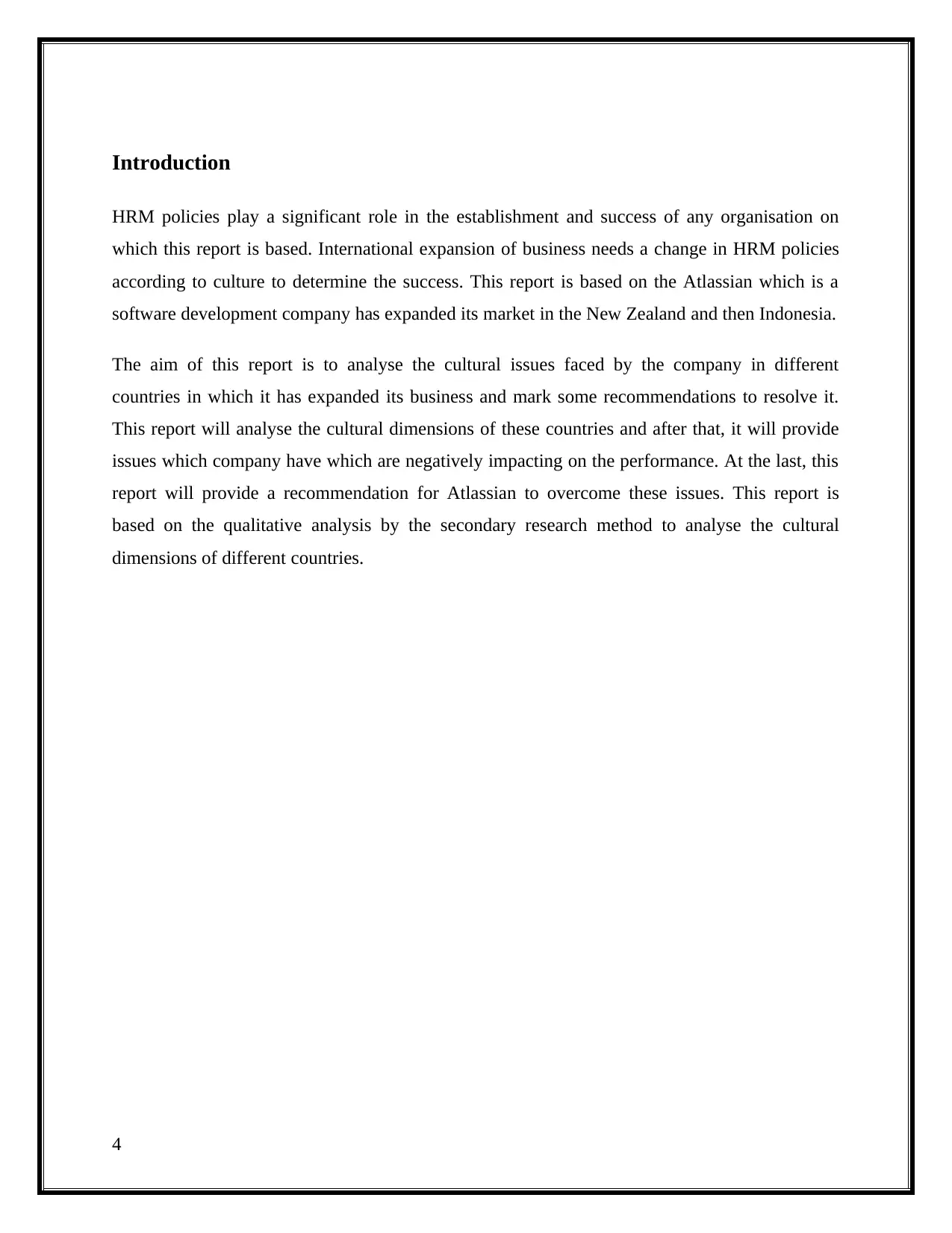
Introduction
HRM policies play a significant role in the establishment and success of any organisation on
which this report is based. International expansion of business needs a change in HRM policies
according to culture to determine the success. This report is based on the Atlassian which is a
software development company has expanded its market in the New Zealand and then Indonesia.
The aim of this report is to analyse the cultural issues faced by the company in different
countries in which it has expanded its business and mark some recommendations to resolve it.
This report will analyse the cultural dimensions of these countries and after that, it will provide
issues which company have which are negatively impacting on the performance. At the last, this
report will provide a recommendation for Atlassian to overcome these issues. This report is
based on the qualitative analysis by the secondary research method to analyse the cultural
dimensions of different countries.
4
HRM policies play a significant role in the establishment and success of any organisation on
which this report is based. International expansion of business needs a change in HRM policies
according to culture to determine the success. This report is based on the Atlassian which is a
software development company has expanded its market in the New Zealand and then Indonesia.
The aim of this report is to analyse the cultural issues faced by the company in different
countries in which it has expanded its business and mark some recommendations to resolve it.
This report will analyse the cultural dimensions of these countries and after that, it will provide
issues which company have which are negatively impacting on the performance. At the last, this
report will provide a recommendation for Atlassian to overcome these issues. This report is
based on the qualitative analysis by the secondary research method to analyse the cultural
dimensions of different countries.
4
Paraphrase This Document
Need a fresh take? Get an instant paraphrase of this document with our AI Paraphraser
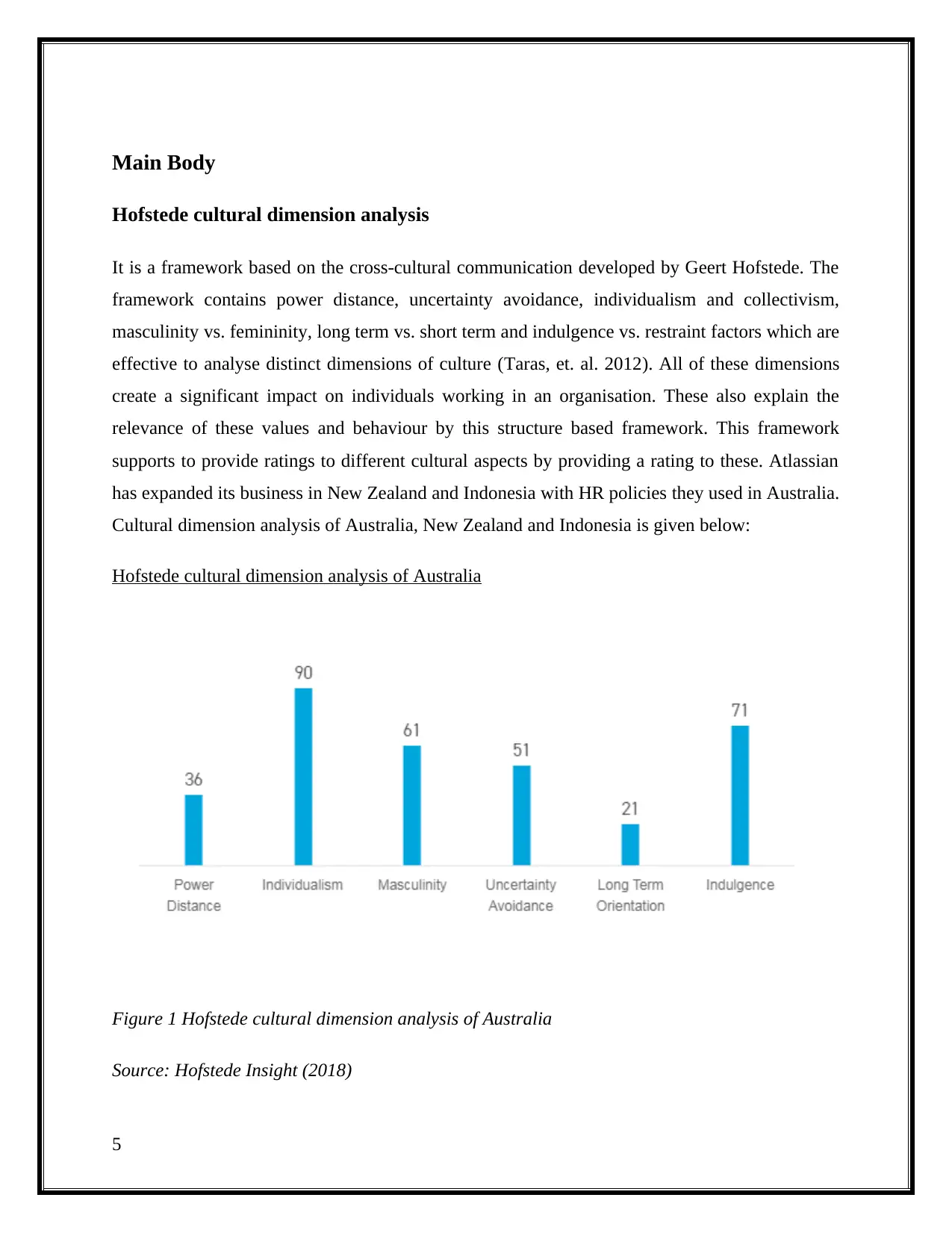
Main Body
Hofstede cultural dimension analysis
It is a framework based on the cross-cultural communication developed by Geert Hofstede. The
framework contains power distance, uncertainty avoidance, individualism and collectivism,
masculinity vs. femininity, long term vs. short term and indulgence vs. restraint factors which are
effective to analyse distinct dimensions of culture (Taras, et. al. 2012). All of these dimensions
create a significant impact on individuals working in an organisation. These also explain the
relevance of these values and behaviour by this structure based framework. This framework
supports to provide ratings to different cultural aspects by providing a rating to these. Atlassian
has expanded its business in New Zealand and Indonesia with HR policies they used in Australia.
Cultural dimension analysis of Australia, New Zealand and Indonesia is given below:
Hofstede cultural dimension analysis of Australia
Figure 1 Hofstede cultural dimension analysis of Australia
Source: Hofstede Insight (2018)
5
Hofstede cultural dimension analysis
It is a framework based on the cross-cultural communication developed by Geert Hofstede. The
framework contains power distance, uncertainty avoidance, individualism and collectivism,
masculinity vs. femininity, long term vs. short term and indulgence vs. restraint factors which are
effective to analyse distinct dimensions of culture (Taras, et. al. 2012). All of these dimensions
create a significant impact on individuals working in an organisation. These also explain the
relevance of these values and behaviour by this structure based framework. This framework
supports to provide ratings to different cultural aspects by providing a rating to these. Atlassian
has expanded its business in New Zealand and Indonesia with HR policies they used in Australia.
Cultural dimension analysis of Australia, New Zealand and Indonesia is given below:
Hofstede cultural dimension analysis of Australia
Figure 1 Hofstede cultural dimension analysis of Australia
Source: Hofstede Insight (2018)
5
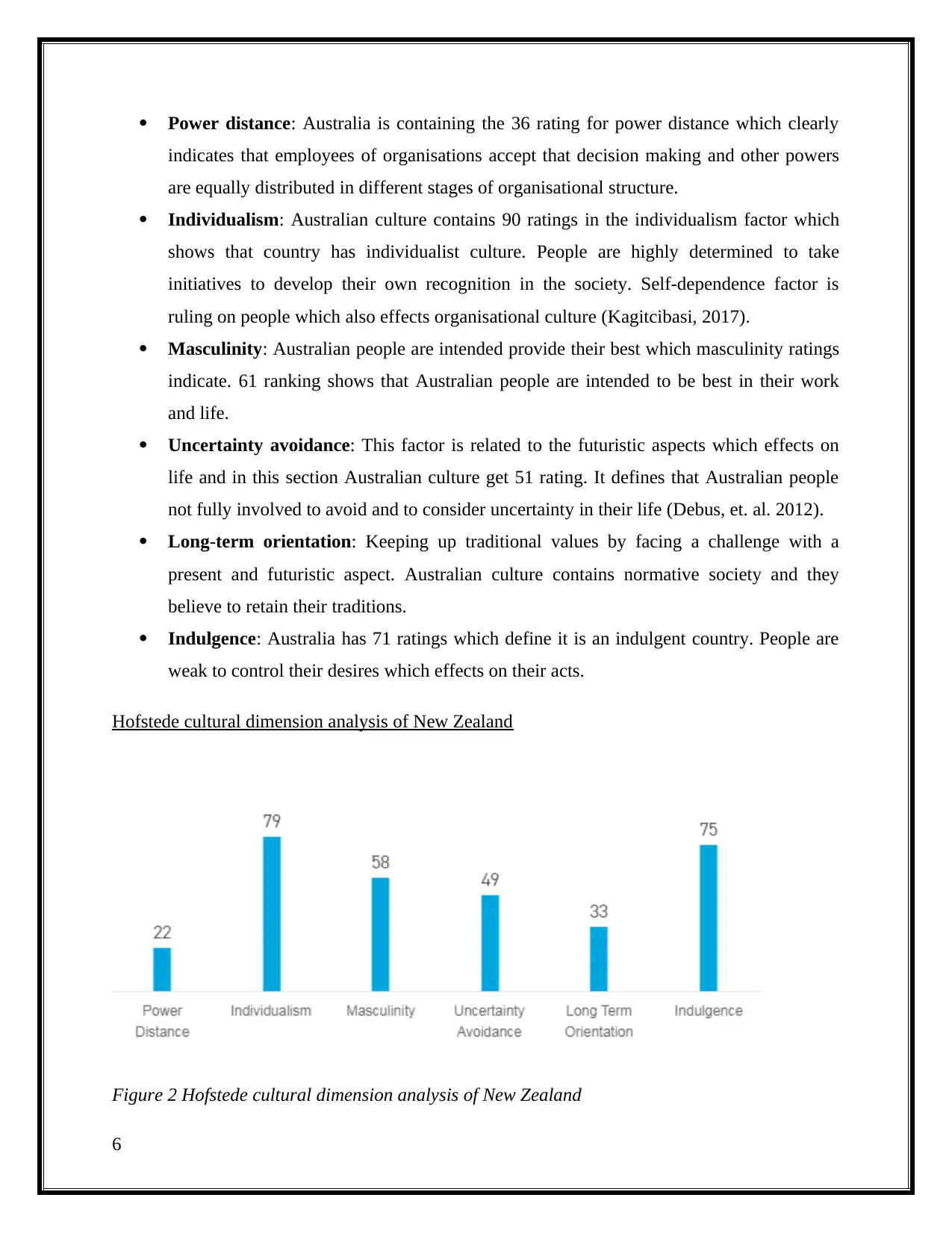
Power distance: Australia is containing the 36 rating for power distance which clearly
indicates that employees of organisations accept that decision making and other powers
are equally distributed in different stages of organisational structure.
Individualism: Australian culture contains 90 ratings in the individualism factor which
shows that country has individualist culture. People are highly determined to take
initiatives to develop their own recognition in the society. Self-dependence factor is
ruling on people which also effects organisational culture (Kagitcibasi, 2017).
Masculinity: Australian people are intended provide their best which masculinity ratings
indicate. 61 ranking shows that Australian people are intended to be best in their work
and life.
Uncertainty avoidance: This factor is related to the futuristic aspects which effects on
life and in this section Australian culture get 51 rating. It defines that Australian people
not fully involved to avoid and to consider uncertainty in their life (Debus, et. al. 2012).
Long-term orientation: Keeping up traditional values by facing a challenge with a
present and futuristic aspect. Australian culture contains normative society and they
believe to retain their traditions.
Indulgence: Australia has 71 ratings which define it is an indulgent country. People are
weak to control their desires which effects on their acts.
Hofstede cultural dimension analysis of New Zealand
Figure 2 Hofstede cultural dimension analysis of New Zealand
6
indicates that employees of organisations accept that decision making and other powers
are equally distributed in different stages of organisational structure.
Individualism: Australian culture contains 90 ratings in the individualism factor which
shows that country has individualist culture. People are highly determined to take
initiatives to develop their own recognition in the society. Self-dependence factor is
ruling on people which also effects organisational culture (Kagitcibasi, 2017).
Masculinity: Australian people are intended provide their best which masculinity ratings
indicate. 61 ranking shows that Australian people are intended to be best in their work
and life.
Uncertainty avoidance: This factor is related to the futuristic aspects which effects on
life and in this section Australian culture get 51 rating. It defines that Australian people
not fully involved to avoid and to consider uncertainty in their life (Debus, et. al. 2012).
Long-term orientation: Keeping up traditional values by facing a challenge with a
present and futuristic aspect. Australian culture contains normative society and they
believe to retain their traditions.
Indulgence: Australia has 71 ratings which define it is an indulgent country. People are
weak to control their desires which effects on their acts.
Hofstede cultural dimension analysis of New Zealand
Figure 2 Hofstede cultural dimension analysis of New Zealand
6
⊘ This is a preview!⊘
Do you want full access?
Subscribe today to unlock all pages.

Trusted by 1+ million students worldwide
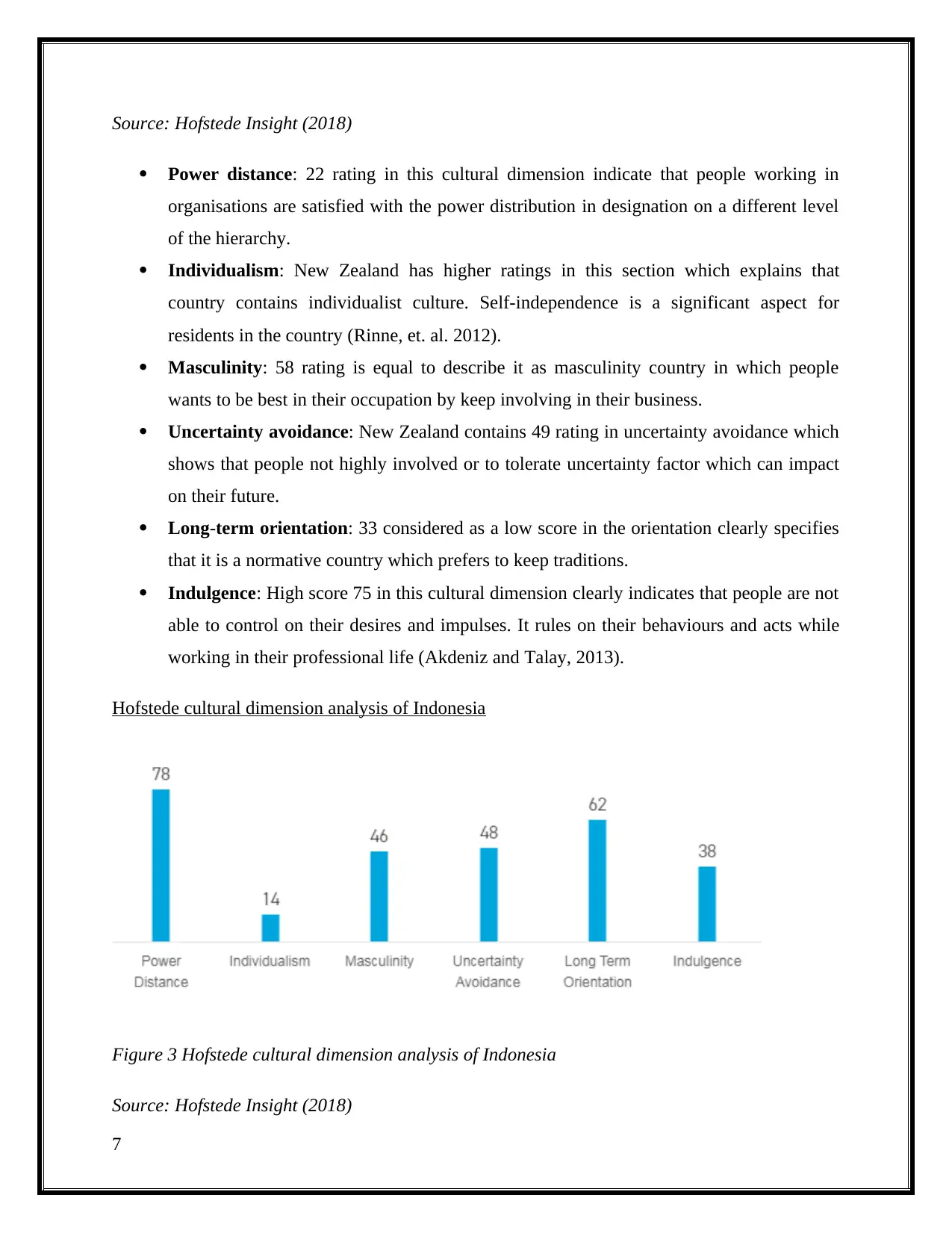
Source: Hofstede Insight (2018)
Power distance: 22 rating in this cultural dimension indicate that people working in
organisations are satisfied with the power distribution in designation on a different level
of the hierarchy.
Individualism: New Zealand has higher ratings in this section which explains that
country contains individualist culture. Self-independence is a significant aspect for
residents in the country (Rinne, et. al. 2012).
Masculinity: 58 rating is equal to describe it as masculinity country in which people
wants to be best in their occupation by keep involving in their business.
Uncertainty avoidance: New Zealand contains 49 rating in uncertainty avoidance which
shows that people not highly involved or to tolerate uncertainty factor which can impact
on their future.
Long-term orientation: 33 considered as a low score in the orientation clearly specifies
that it is a normative country which prefers to keep traditions.
Indulgence: High score 75 in this cultural dimension clearly indicates that people are not
able to control on their desires and impulses. It rules on their behaviours and acts while
working in their professional life (Akdeniz and Talay, 2013).
Hofstede cultural dimension analysis of Indonesia
Figure 3 Hofstede cultural dimension analysis of Indonesia
Source: Hofstede Insight (2018)
7
Power distance: 22 rating in this cultural dimension indicate that people working in
organisations are satisfied with the power distribution in designation on a different level
of the hierarchy.
Individualism: New Zealand has higher ratings in this section which explains that
country contains individualist culture. Self-independence is a significant aspect for
residents in the country (Rinne, et. al. 2012).
Masculinity: 58 rating is equal to describe it as masculinity country in which people
wants to be best in their occupation by keep involving in their business.
Uncertainty avoidance: New Zealand contains 49 rating in uncertainty avoidance which
shows that people not highly involved or to tolerate uncertainty factor which can impact
on their future.
Long-term orientation: 33 considered as a low score in the orientation clearly specifies
that it is a normative country which prefers to keep traditions.
Indulgence: High score 75 in this cultural dimension clearly indicates that people are not
able to control on their desires and impulses. It rules on their behaviours and acts while
working in their professional life (Akdeniz and Talay, 2013).
Hofstede cultural dimension analysis of Indonesia
Figure 3 Hofstede cultural dimension analysis of Indonesia
Source: Hofstede Insight (2018)
7
Paraphrase This Document
Need a fresh take? Get an instant paraphrase of this document with our AI Paraphraser
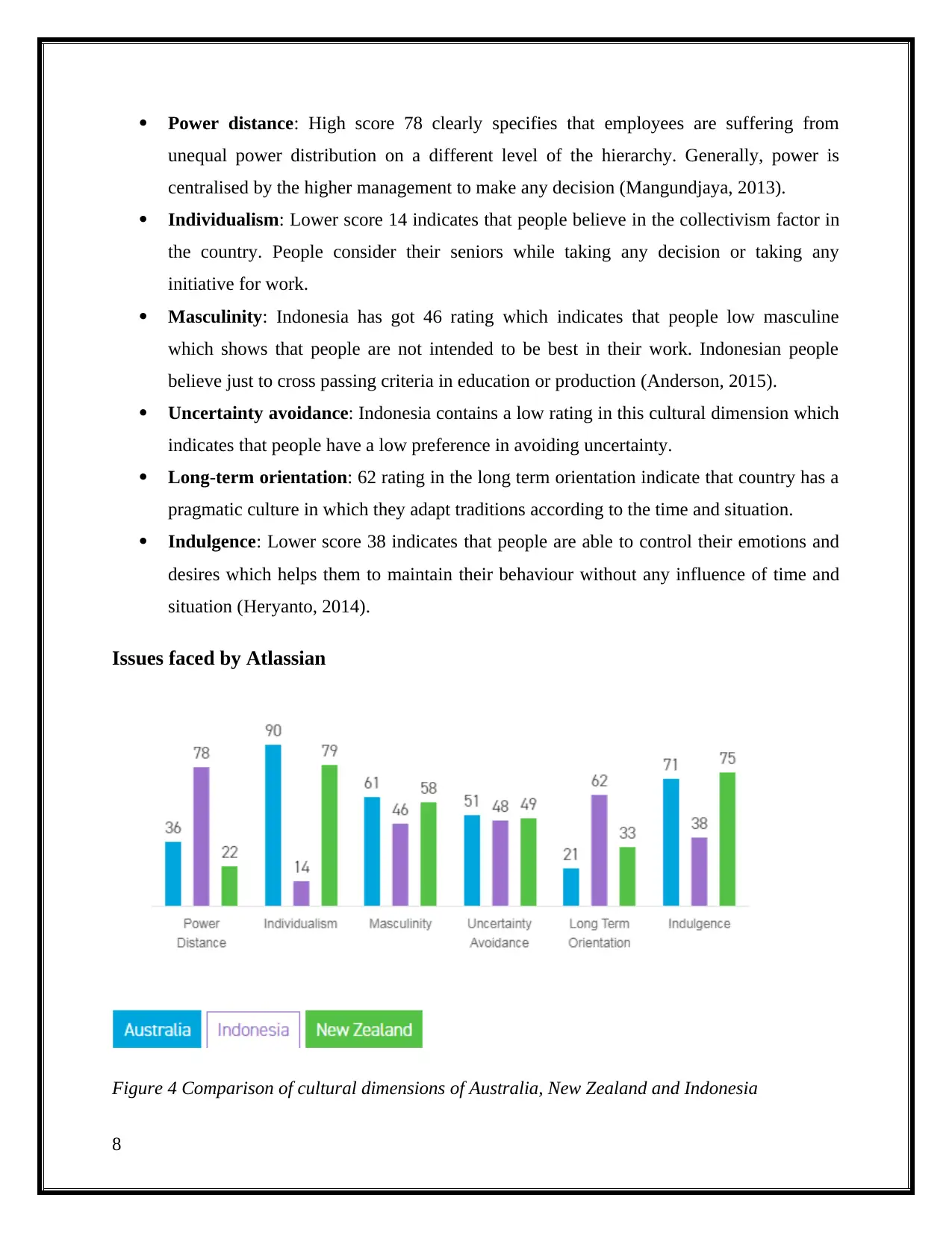
Power distance: High score 78 clearly specifies that employees are suffering from
unequal power distribution on a different level of the hierarchy. Generally, power is
centralised by the higher management to make any decision (Mangundjaya, 2013).
Individualism: Lower score 14 indicates that people believe in the collectivism factor in
the country. People consider their seniors while taking any decision or taking any
initiative for work.
Masculinity: Indonesia has got 46 rating which indicates that people low masculine
which shows that people are not intended to be best in their work. Indonesian people
believe just to cross passing criteria in education or production (Anderson, 2015).
Uncertainty avoidance: Indonesia contains a low rating in this cultural dimension which
indicates that people have a low preference in avoiding uncertainty.
Long-term orientation: 62 rating in the long term orientation indicate that country has a
pragmatic culture in which they adapt traditions according to the time and situation.
Indulgence: Lower score 38 indicates that people are able to control their emotions and
desires which helps them to maintain their behaviour without any influence of time and
situation (Heryanto, 2014).
Issues faced by Atlassian
Figure 4 Comparison of cultural dimensions of Australia, New Zealand and Indonesia
8
unequal power distribution on a different level of the hierarchy. Generally, power is
centralised by the higher management to make any decision (Mangundjaya, 2013).
Individualism: Lower score 14 indicates that people believe in the collectivism factor in
the country. People consider their seniors while taking any decision or taking any
initiative for work.
Masculinity: Indonesia has got 46 rating which indicates that people low masculine
which shows that people are not intended to be best in their work. Indonesian people
believe just to cross passing criteria in education or production (Anderson, 2015).
Uncertainty avoidance: Indonesia contains a low rating in this cultural dimension which
indicates that people have a low preference in avoiding uncertainty.
Long-term orientation: 62 rating in the long term orientation indicate that country has a
pragmatic culture in which they adapt traditions according to the time and situation.
Indulgence: Lower score 38 indicates that people are able to control their emotions and
desires which helps them to maintain their behaviour without any influence of time and
situation (Heryanto, 2014).
Issues faced by Atlassian
Figure 4 Comparison of cultural dimensions of Australia, New Zealand and Indonesia
8
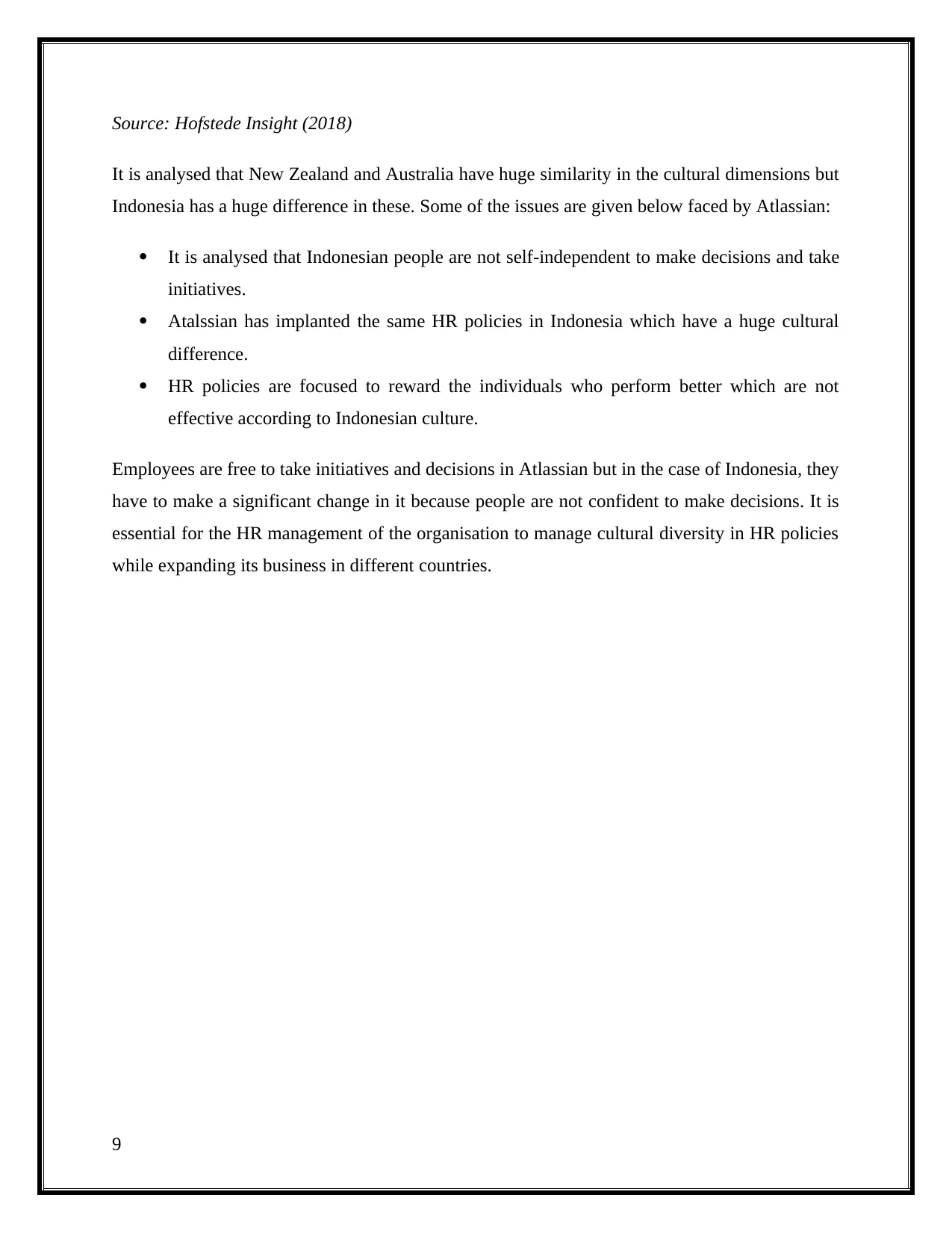
Source: Hofstede Insight (2018)
It is analysed that New Zealand and Australia have huge similarity in the cultural dimensions but
Indonesia has a huge difference in these. Some of the issues are given below faced by Atlassian:
It is analysed that Indonesian people are not self-independent to make decisions and take
initiatives.
Atalssian has implanted the same HR policies in Indonesia which have a huge cultural
difference.
HR policies are focused to reward the individuals who perform better which are not
effective according to Indonesian culture.
Employees are free to take initiatives and decisions in Atlassian but in the case of Indonesia, they
have to make a significant change in it because people are not confident to make decisions. It is
essential for the HR management of the organisation to manage cultural diversity in HR policies
while expanding its business in different countries.
9
It is analysed that New Zealand and Australia have huge similarity in the cultural dimensions but
Indonesia has a huge difference in these. Some of the issues are given below faced by Atlassian:
It is analysed that Indonesian people are not self-independent to make decisions and take
initiatives.
Atalssian has implanted the same HR policies in Indonesia which have a huge cultural
difference.
HR policies are focused to reward the individuals who perform better which are not
effective according to Indonesian culture.
Employees are free to take initiatives and decisions in Atlassian but in the case of Indonesia, they
have to make a significant change in it because people are not confident to make decisions. It is
essential for the HR management of the organisation to manage cultural diversity in HR policies
while expanding its business in different countries.
9
⊘ This is a preview!⊘
Do you want full access?
Subscribe today to unlock all pages.

Trusted by 1+ million students worldwide
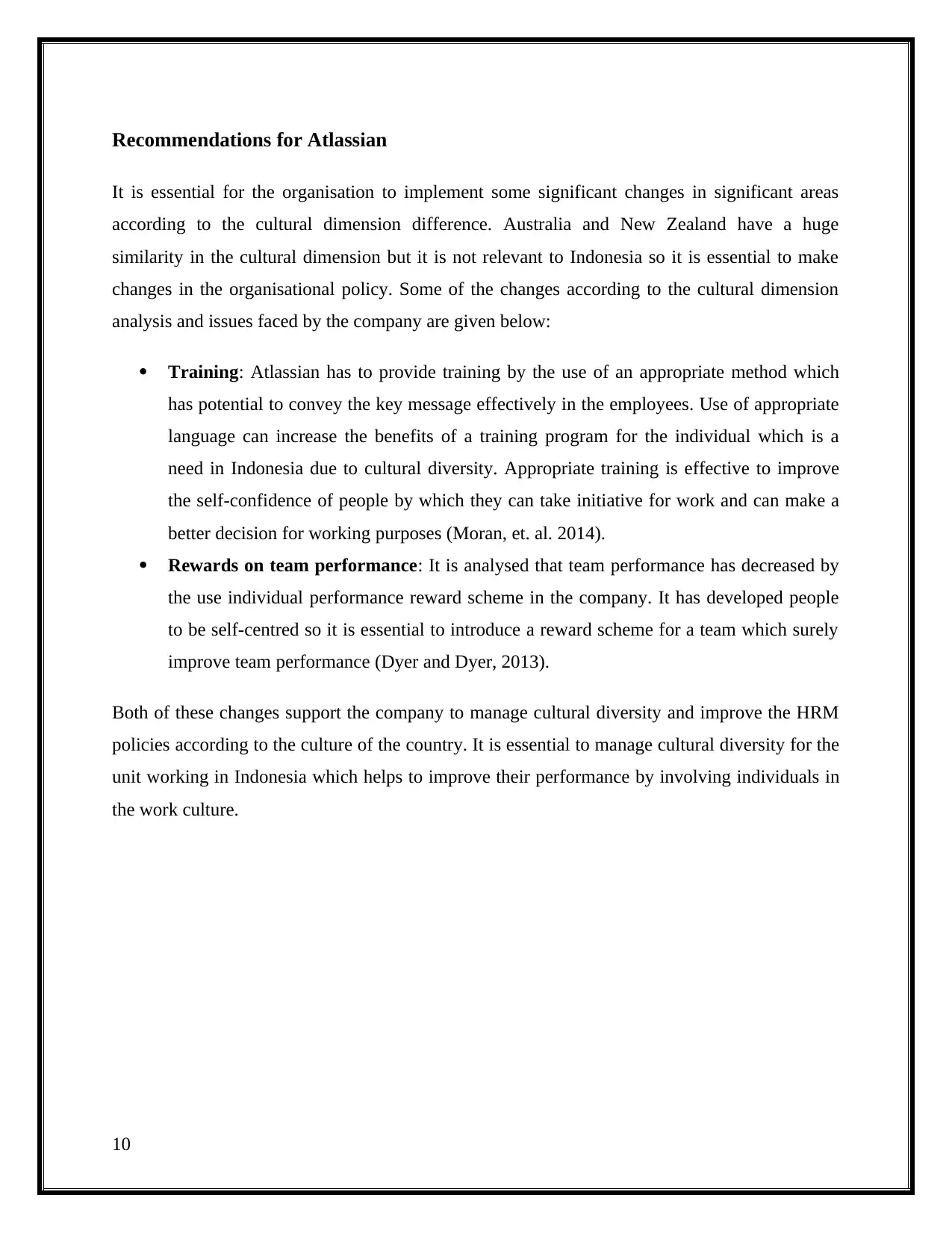
Recommendations for Atlassian
It is essential for the organisation to implement some significant changes in significant areas
according to the cultural dimension difference. Australia and New Zealand have a huge
similarity in the cultural dimension but it is not relevant to Indonesia so it is essential to make
changes in the organisational policy. Some of the changes according to the cultural dimension
analysis and issues faced by the company are given below:
Training: Atlassian has to provide training by the use of an appropriate method which
has potential to convey the key message effectively in the employees. Use of appropriate
language can increase the benefits of a training program for the individual which is a
need in Indonesia due to cultural diversity. Appropriate training is effective to improve
the self-confidence of people by which they can take initiative for work and can make a
better decision for working purposes (Moran, et. al. 2014).
Rewards on team performance: It is analysed that team performance has decreased by
the use individual performance reward scheme in the company. It has developed people
to be self-centred so it is essential to introduce a reward scheme for a team which surely
improve team performance (Dyer and Dyer, 2013).
Both of these changes support the company to manage cultural diversity and improve the HRM
policies according to the culture of the country. It is essential to manage cultural diversity for the
unit working in Indonesia which helps to improve their performance by involving individuals in
the work culture.
10
It is essential for the organisation to implement some significant changes in significant areas
according to the cultural dimension difference. Australia and New Zealand have a huge
similarity in the cultural dimension but it is not relevant to Indonesia so it is essential to make
changes in the organisational policy. Some of the changes according to the cultural dimension
analysis and issues faced by the company are given below:
Training: Atlassian has to provide training by the use of an appropriate method which
has potential to convey the key message effectively in the employees. Use of appropriate
language can increase the benefits of a training program for the individual which is a
need in Indonesia due to cultural diversity. Appropriate training is effective to improve
the self-confidence of people by which they can take initiative for work and can make a
better decision for working purposes (Moran, et. al. 2014).
Rewards on team performance: It is analysed that team performance has decreased by
the use individual performance reward scheme in the company. It has developed people
to be self-centred so it is essential to introduce a reward scheme for a team which surely
improve team performance (Dyer and Dyer, 2013).
Both of these changes support the company to manage cultural diversity and improve the HRM
policies according to the culture of the country. It is essential to manage cultural diversity for the
unit working in Indonesia which helps to improve their performance by involving individuals in
the work culture.
10
Paraphrase This Document
Need a fresh take? Get an instant paraphrase of this document with our AI Paraphraser
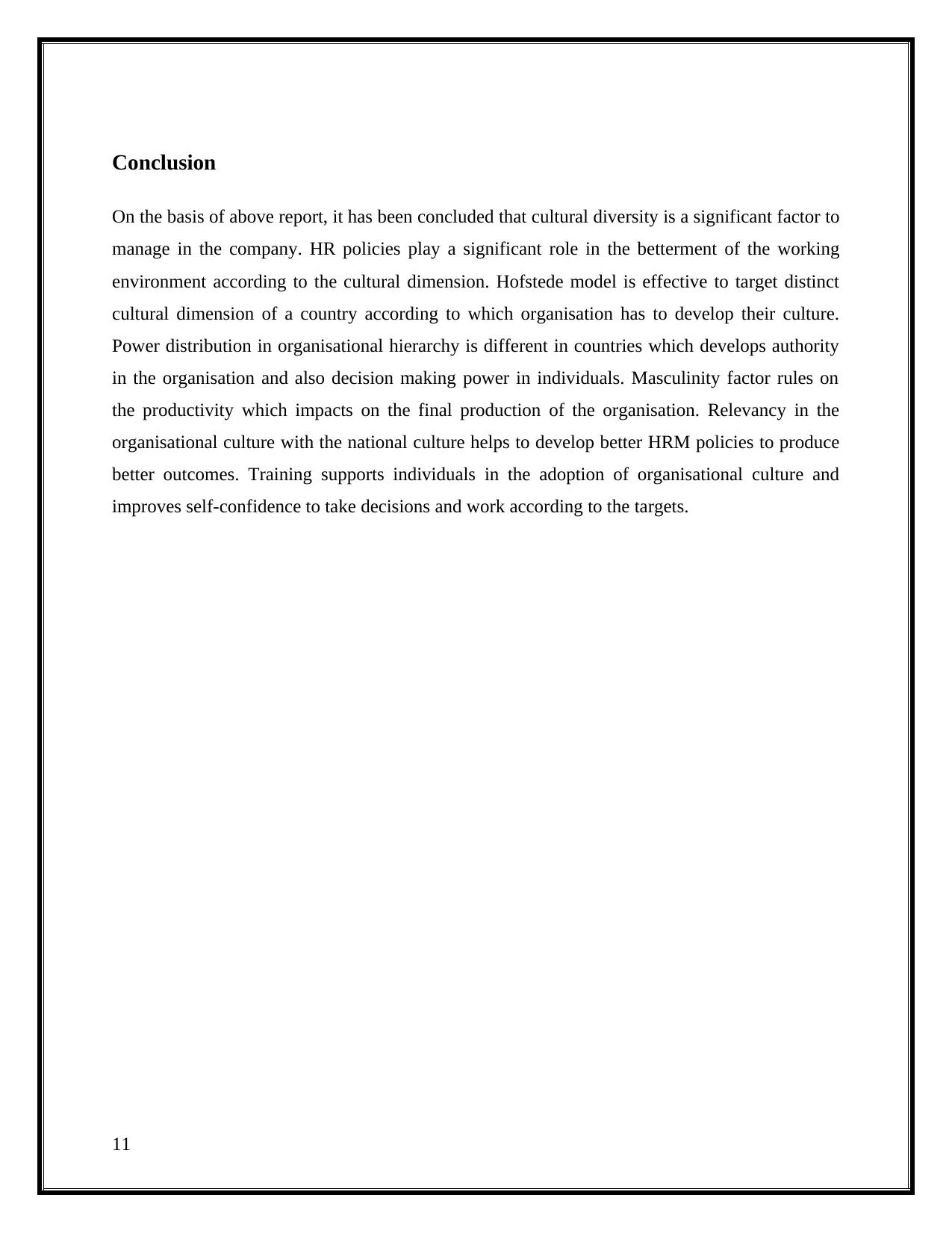
Conclusion
On the basis of above report, it has been concluded that cultural diversity is a significant factor to
manage in the company. HR policies play a significant role in the betterment of the working
environment according to the cultural dimension. Hofstede model is effective to target distinct
cultural dimension of a country according to which organisation has to develop their culture.
Power distribution in organisational hierarchy is different in countries which develops authority
in the organisation and also decision making power in individuals. Masculinity factor rules on
the productivity which impacts on the final production of the organisation. Relevancy in the
organisational culture with the national culture helps to develop better HRM policies to produce
better outcomes. Training supports individuals in the adoption of organisational culture and
improves self-confidence to take decisions and work according to the targets.
11
On the basis of above report, it has been concluded that cultural diversity is a significant factor to
manage in the company. HR policies play a significant role in the betterment of the working
environment according to the cultural dimension. Hofstede model is effective to target distinct
cultural dimension of a country according to which organisation has to develop their culture.
Power distribution in organisational hierarchy is different in countries which develops authority
in the organisation and also decision making power in individuals. Masculinity factor rules on
the productivity which impacts on the final production of the organisation. Relevancy in the
organisational culture with the national culture helps to develop better HRM policies to produce
better outcomes. Training supports individuals in the adoption of organisational culture and
improves self-confidence to take decisions and work according to the targets.
11
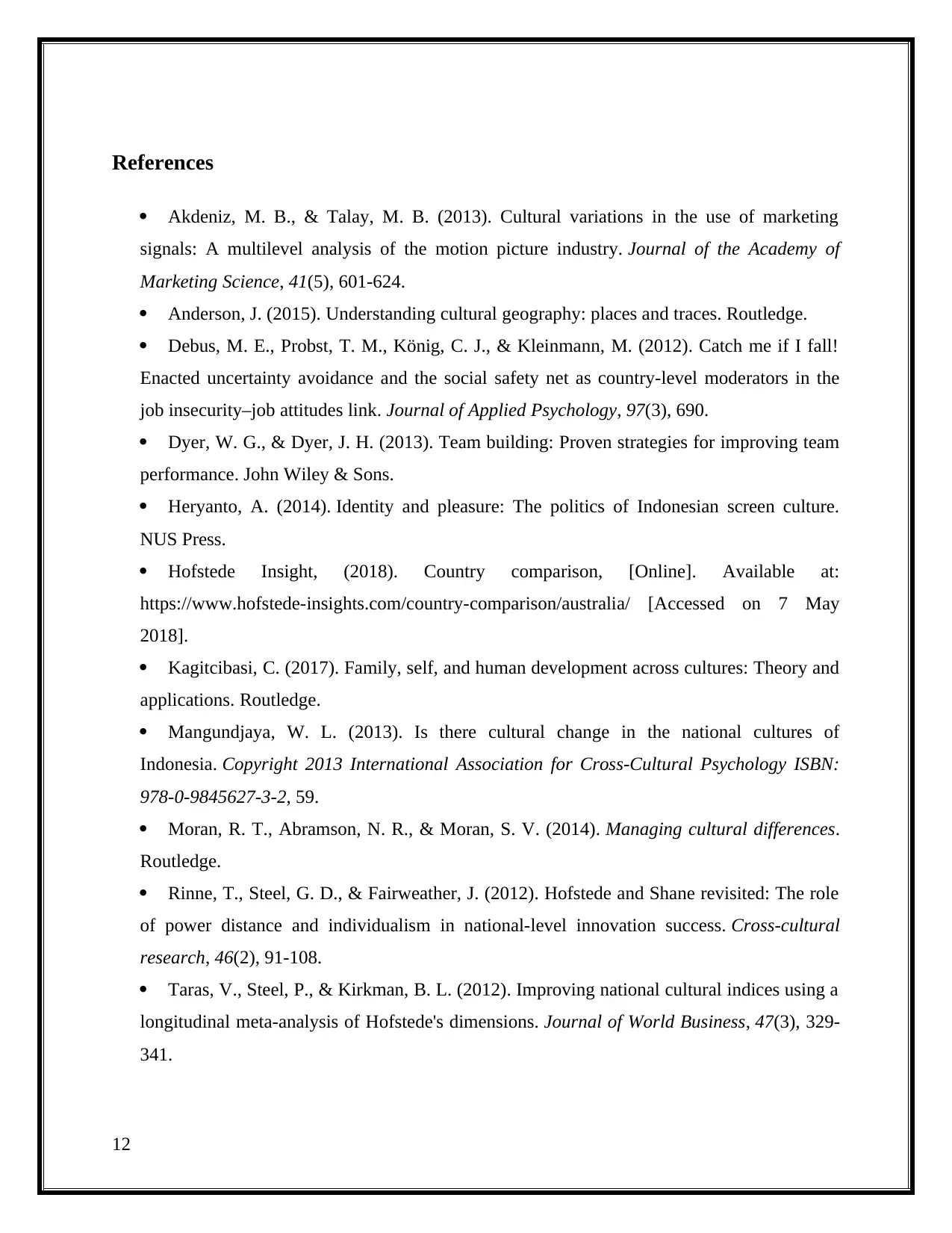
References
Akdeniz, M. B., & Talay, M. B. (2013). Cultural variations in the use of marketing
signals: A multilevel analysis of the motion picture industry. Journal of the Academy of
Marketing Science, 41(5), 601-624.
Anderson, J. (2015). Understanding cultural geography: places and traces. Routledge.
Debus, M. E., Probst, T. M., König, C. J., & Kleinmann, M. (2012). Catch me if I fall!
Enacted uncertainty avoidance and the social safety net as country-level moderators in the
job insecurity–job attitudes link. Journal of Applied Psychology, 97(3), 690.
Dyer, W. G., & Dyer, J. H. (2013). Team building: Proven strategies for improving team
performance. John Wiley & Sons.
Heryanto, A. (2014). Identity and pleasure: The politics of Indonesian screen culture.
NUS Press.
Hofstede Insight, (2018). Country comparison, [Online]. Available at:
https://www.hofstede-insights.com/country-comparison/australia/ [Accessed on 7 May
2018].
Kagitcibasi, C. (2017). Family, self, and human development across cultures: Theory and
applications. Routledge.
Mangundjaya, W. L. (2013). Is there cultural change in the national cultures of
Indonesia. Copyright 2013 International Association for Cross-Cultural Psychology ISBN:
978-0-9845627-3-2, 59.
Moran, R. T., Abramson, N. R., & Moran, S. V. (2014). Managing cultural differences.
Routledge.
Rinne, T., Steel, G. D., & Fairweather, J. (2012). Hofstede and Shane revisited: The role
of power distance and individualism in national-level innovation success. Cross-cultural
research, 46(2), 91-108.
Taras, V., Steel, P., & Kirkman, B. L. (2012). Improving national cultural indices using a
longitudinal meta-analysis of Hofstede's dimensions. Journal of World Business, 47(3), 329-
341.
12
Akdeniz, M. B., & Talay, M. B. (2013). Cultural variations in the use of marketing
signals: A multilevel analysis of the motion picture industry. Journal of the Academy of
Marketing Science, 41(5), 601-624.
Anderson, J. (2015). Understanding cultural geography: places and traces. Routledge.
Debus, M. E., Probst, T. M., König, C. J., & Kleinmann, M. (2012). Catch me if I fall!
Enacted uncertainty avoidance and the social safety net as country-level moderators in the
job insecurity–job attitudes link. Journal of Applied Psychology, 97(3), 690.
Dyer, W. G., & Dyer, J. H. (2013). Team building: Proven strategies for improving team
performance. John Wiley & Sons.
Heryanto, A. (2014). Identity and pleasure: The politics of Indonesian screen culture.
NUS Press.
Hofstede Insight, (2018). Country comparison, [Online]. Available at:
https://www.hofstede-insights.com/country-comparison/australia/ [Accessed on 7 May
2018].
Kagitcibasi, C. (2017). Family, self, and human development across cultures: Theory and
applications. Routledge.
Mangundjaya, W. L. (2013). Is there cultural change in the national cultures of
Indonesia. Copyright 2013 International Association for Cross-Cultural Psychology ISBN:
978-0-9845627-3-2, 59.
Moran, R. T., Abramson, N. R., & Moran, S. V. (2014). Managing cultural differences.
Routledge.
Rinne, T., Steel, G. D., & Fairweather, J. (2012). Hofstede and Shane revisited: The role
of power distance and individualism in national-level innovation success. Cross-cultural
research, 46(2), 91-108.
Taras, V., Steel, P., & Kirkman, B. L. (2012). Improving national cultural indices using a
longitudinal meta-analysis of Hofstede's dimensions. Journal of World Business, 47(3), 329-
341.
12
⊘ This is a preview!⊘
Do you want full access?
Subscribe today to unlock all pages.

Trusted by 1+ million students worldwide
1 out of 12
Related Documents
Your All-in-One AI-Powered Toolkit for Academic Success.
+13062052269
info@desklib.com
Available 24*7 on WhatsApp / Email
![[object Object]](/_next/static/media/star-bottom.7253800d.svg)
Unlock your academic potential
Copyright © 2020–2026 A2Z Services. All Rights Reserved. Developed and managed by ZUCOL.





